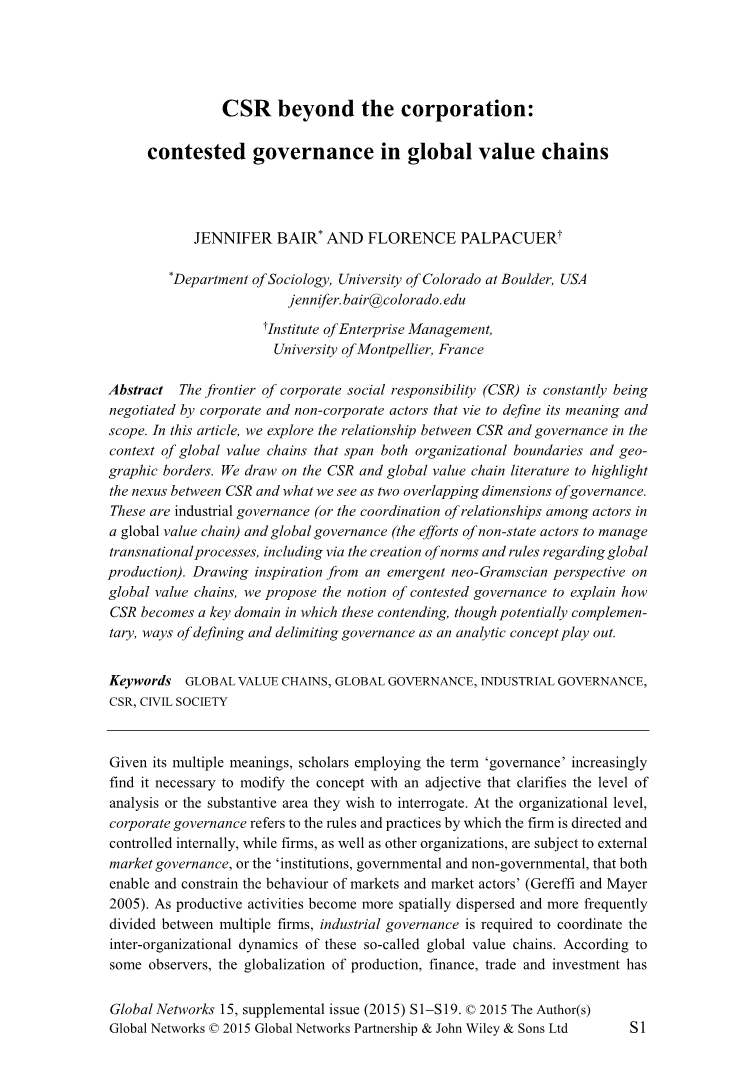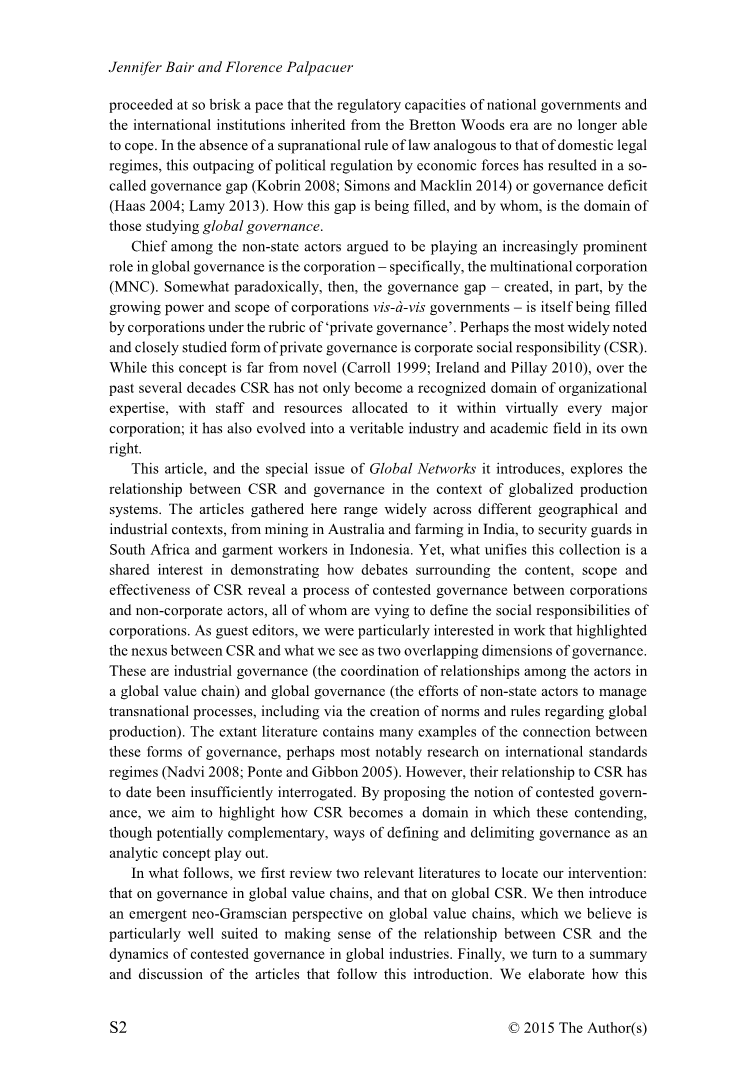英语原文共 20 页,剩余内容已隐藏,支付完成后下载完整资料
Authors :JENNIFER BAIR AND FLORENCE PALPACUER
CSR beyond the corporation:contested governance in global value chains
A JOURNAL OF TRANSNATIONAL AFFAIRS 2015 Vol.15 S1-S19 1470-2266
企业社会责任:全球价值链中有争议的治理
Abstract The frontier of corporate social responsibility (CSR) is constantly being negotiated by corporate and non-corporate actors that vie to define its meaning and scope. In this article, we explore the relationship between CSR and governance in the context of global value chains that span both organizational boundaries and geo-graphic borders. We draw on the CSR and global value chain literature to highlight the nexus between CSR and what we see as two overlapping dimensions of governance.These are industrial governance (or the coordination of relationships among actors in a global value chain) and global governance (the efforts of non-state actors to manage transnational processes, including via the creation of norms and rules regarding global production). Drawing inspiration from an emergent neo-Gramscian perspective on global value chains, we propose the notion of contested governance to explain how CSR becomes a key domain in which these contending, though potentially complementary, ways of defining and delimiting governance as an analytic concept play out.
摘要:企业社会责任(CSR)的边界正在不断地由企业和非企业参与者进行界定,他们试图界定其含义和范围。在本文中,我们探讨了跨越组织边界和地理边界的全球价值链中企业社会责任与治理之间的关系。我们利用企业社会责任和全球价值链文献来强调企业社会责任与我们视为治理的两个重叠维度之间的联系。它们是工业治理(或全球价值链中各参与者之间的关系的协调)和全球治理(非国家行为者为管理跨国过程所做的努力,包括通过制定有关全球生产的规范和规则)。从新兴的全球价值链新葛新兰西主义视角(emergent neo-Gramscian perspective)中汲取灵感,我们提出了有争议的治理见解,以解释企业社会责任如何成为一个关键领域,在这些主张中,尽管存在潜在的互补性,但这些竞争性的定义和界定治理作为分析概念的方式却发挥了作用。
Keywords GLOBAL VALUE CHAINS, GLOBAL GOVERNANCE, INDUSTRIAL GOVERNANCE,CSR, CIVIL SOCIETY
关键字全球价值链,全球治理,工业治理,企业社会责任,公民社会
Given its multiple meanings, scholars employing the term lsquo;governancersquo; increasingly find it necessary to modify the concept with an adjective that clarifies the level of analysis or the substantive area they wish to interrogate. At the organizational level, corporate governance refers to the rules and practices by which the firm is directed and controlled internally, while firms, as well as other organizations, are subject to external market governance, or the lsquo;institutions, governmental and non-governmental, that both enable and constrain the behaviour of markets and market actorsrsquo; (Gereffi and Mayer 2005). As productive activities become more spatially dispersed and more frequently divided between multiple firms, industrial governance is required to coordinate the inter-organizational dynamics of these so-called global value chains. According to some observers, the globalization of production, finance, trade and investment has proceeded at so brisk a pace that the regulatory capacities of national governments and the international institutions inherited from the Bretton Woods era are no longer able to cope. In the absence of a supranational rule of law analogous to that of domestic legal regimes, this outpacing of political regulation by economic forces has resulted in a so-called governance gap (Kobrin 2008; Simons and Macklin 2014) or governance deficit (Haas 2004; Lamy 2013). How this gap is being filled, and by whom, is the domain of those studying global governance.
考虑到它的多重含义,使用“治理”一词的学者越来越发现有必要用形容词来修饰这个概念,以澄清分析的水平或他们想要询问的实质性领域。在组织层面上,公司治理是指公司在内部指导和控制的规则和惯例,而公司以及其他组织则受外部市场治理,或者“政府和非政府机构,它们既能够促成市场和市场参与者的行为,又能够限制它们的行为”(Gereffi and Mayer 2005)。随着生产活动在空间上的分散程度越来越高,并且在多个公司之间分配的频率越来越高,需要工业治理来协调这些所谓的全球价值链的组织间动态。一些观察者认为,生产,金融,贸易和投资的全球化进程如此迅速,以至于布雷顿森林(Bretton Woods)时代遗留下来的各国政府和国际机构的监管能力已无法应付。在没有类似于国内法律制度的超国家法治的情况下,经济力量对政治法规的超越已经导致了所谓的治理鸿沟(Kobrin 2008; Simonsand Macklin 2014)或治理赤字(Haas 2004; Lamy 2013)。如何填补这一空白,以及由谁来填补,是研究全球治理的学者们的研究领域。
Chief among the non-state actors argued to be playing an increasingly prominent role in global governance is the corporation specifically, the multinational corporation (MNC). Somewhat paradoxically, then, the governance gap-created, in part, by the growing power and scope of corporations vis-agrave;-vis governments is itself being filled by corporations under the rubric of lsquo;private governancersquo;. Perhaps the most widely noted and closely studied form of private governance is corporate social responsibility (CSR). While this concept is far from novel (Carroll 1999; Ireland and Pillay 2010), over the past several decades CSR has not only become a recognized domain of organizational expertise, with staff and resources allocated to it within virtually every major corporation; it has also evolved into a veritable industry and academic field in its own right.
非国家行为者(NSA)首领明确谈到公司在全球治理中发挥越来越重要的作用,特别是跨国公司(MNC)。有些矛盾的是,治理差距(部分是由公司相对于政府的力量和范围的扩大所造成的)本身被“私人治理”的名义下的公司所填补。私人治理中最受关注和研究最深入的形式也许是公司社会责任(CSR)。尽管这一概念并不新颖(Carroll 1999; Ireland and Pillay 2010),但在过去的几十年中,公司社会责任不仅已成为公认的组织专业知识领域,而且几乎每个大型公司都为其分配了人员和资源。它本身也已发展成为一个名副其实的行业和学术领域。
This article, and the special issue of Global Networks it introduces, explores the relationship between CSR and governance in the context of globalized production systems. The articles gathered here range widely across different geographical and industrial contexts, from mining in Australia and farming in India, to security guards in South Africa and garment workers in Indonesia. Yet, what unifies this collection is a shared interest in demonstrating how debates surrounding the content, scope and effectiveness of CSR reveal a process of contested governance between corporations and non-corporate actors, all of whom are vying to define the social responsibilities of corporations. As guest editors, we were particularly interested in work that highlighted the nexus between CSR and what we see as two overlapping dim
剩余内容已隐藏,支付完成后下载完整资料
资料编号:[235814],资料为PDF文档或Word文档,PDF文档可免费转换为Word
以上是毕业论文外文翻译,课题毕业论文、任务书、文献综述、开题报告、程序设计、图纸设计等资料可联系客服协助查找。




